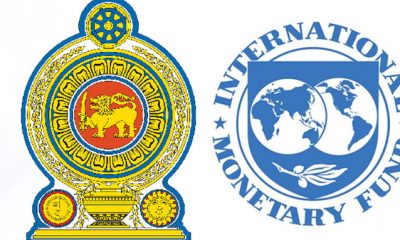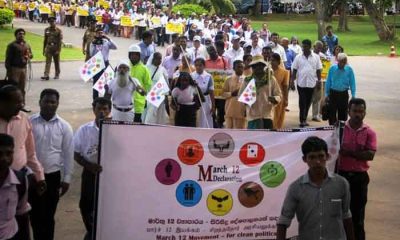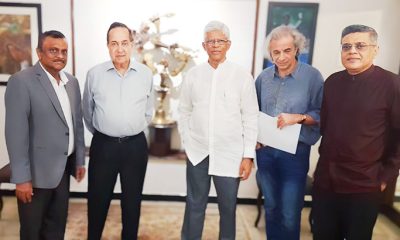News
Pathfinder dialogue with diplomats on good governance & curbing corruption
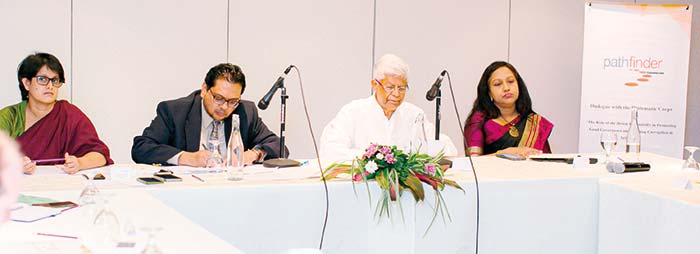
Pathfinder Foundation (PF) last seek hosted its third ‘Dialogue with Diplomats’ in Colombo and deliberated on the topic ‘Role of the Donor Community in Promoting Good Governance and Curbing Corruption in Sri Lanka’.
A news release said this focused on significant contemporary issues as Sri Lanka’s position has declined considerably in the Corruption Perceptions Index (CPI), which ranks countries and territories based on how corrupt their public sector is perceived. The discussion highlighted that corruption is considered a major problem in the country at all levels of society. Corruption weakens, if not destroys, good governance by eroding the citizenry’s trust.
The eminent panel consisted of Dr. Nishan de Mel, Executive Director, Verité Research, as the Lead Presenter with Ms. Nadishani Perera, Executive Director, Transparency International – Sri Lanka; Ms. Subhashini Abeysinghe, Research Director, Verité Research, and Mr. Bernard Goonetilleke, Chairman, Pathfinder Foundation functioning as Discussants.
The participants at this event ranged from representatives of the Colombo-based diplomatic community, international donor agencies, senior government officials, think tanks, NGOs, and private sector representatives.
A was request made at the event to the donor community was to go beyond the usual framework and to request strong anti-corruption measures and accountability as essential conditions for the disbursement of financial aid such as loans, grants, etc. While understanding that the international community represented by diplomats is challenged due to the necessity to balance geopolitics, they were requested to consider this issue from a civil society and public perspective, a PF news release said.
The event further highlighted that the donor community, including institutions and development agencies, can significantly contribute towards combating corruption and improving governance in the disbursement of official development assistance (ODAs) to Sri Lanka by focusing support on initiatives that make information publicly available, transparency of government actions, and promoting the democratic accountability of the public sector, the release said.
In this regard, it was suggested that the donor community change the approach of ODA to (a) focus on rewarding end outcomes rather than processes towards such, when directly supporting the government, (b) Support and leverage non-governmental institutions that make government actions visible, comprehensible and accountable to society (c) Use the IMF and Civil Society governance diagnostics as guides to prioritizing assistance towards improving governance. (d) Take care not to substitute (or detract from) the democratic accountability of the government by the ODA positioning itself to deliver the outcomes on behalf of the government – as has often occurred in the past.
The presentations made by the panel and ensuing discussion highlighted several concerns and suggested important areas for consideration by the donor community when providing assistance and engaging with governments. The fact that less transparent processes in procurement are part of the corrupt system as direct perpetrators or enablers have made corruption a deep-rooted problem, ultimately worsening and undermining development efforts by misusing funds. A disturbing fact highlighted was that there has been no change in widespread corruption even with successive governments, as the malady has spread across political parties and the bureaucracy.
During the discussion that followed, it was mentioned that transparent procurement processes concerning donor assistance were a requirement of the IMF. Therefore, such information is available on relevant websites. It was further highlighted that the Organization for Economic Co-operation and Development’s (OECD) set of guidelines could be used by the donor community to address disbursement and combat misuse of funds. Furthermore, it was suggested that international agencies should think strategically when dealing with their local counterparts, careful of being leveraged in a way that could facilitate corrupt systems bypassing accountability.
An area specifically highlighted was Sri Lanka’s lagging in implementing WTO Trade Facilitation commitments related to custom modernization and cross-border formalities and procedures, where there are high levels of corruption, which creates a force against proper reforms, therefore demanding accountability and conditionality when assisting or restructuring is mandatory. The Human Rights Commission of Sri Lanka, which has the competency to address economic crimes, was noted as a platform where citizens could complain about corruption if needed.
The event was the third in a Dialogue with the Diplomatic Community series organized by the Pathfinder Foundation. The first event held in 2022 focused on the Privatization of State-Owned Enterprises (SOEs) in Sri Lanka, and the second dialogue on the ‘Timing of Next Local Government/Presidential Elections and their implications on the Society and Economy’, was held in August 2023.
PF intends to continue such dialogues, allowing the diplomatic community to discuss crucial issues faced by the country while allowing them to exchange views with individuals and representatives of local institutions that deliberate on issues confronting the country.
News
PM meets UN Resident Coordinator
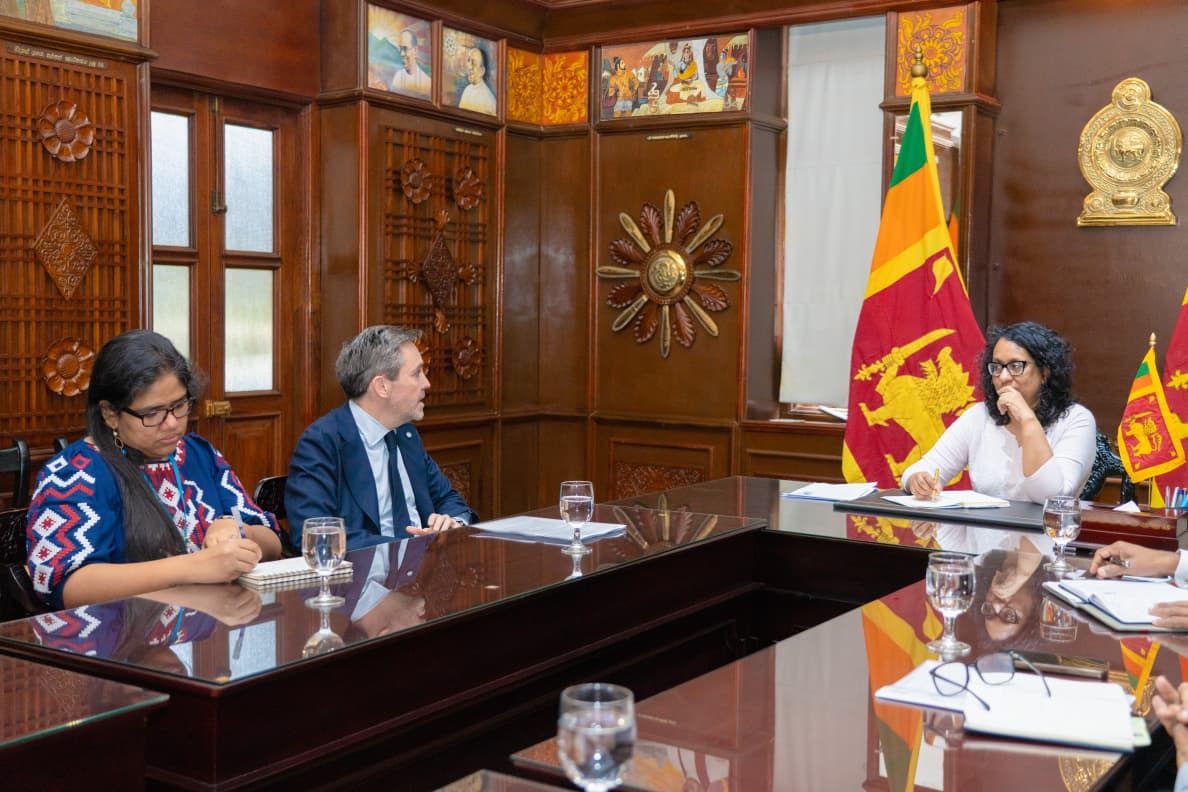
A meeting between Prime Minister Dr. Harini Amarasuriya and the United Nations Resident Coordinator in Sri Lanka, Marc-Andreé Franche, was held on the 20th of December 2025 at the Prime Minister’s Office.
During the meeting, Mr. Marc-Andreé Franche commended the swift coordination in which the Government acted to rescue affected communities and provide relief following the recent natural disaster situation faced by Sri Lanka.
Comparing experiences from other countries around the world, he noted that the level of international support Sri Lanka has received during such a disaster is exceptionally high. He further emphasized that he would utilize both his professional capacity and personal commitment to the fullest extent to ensure that Sri Lanka receives the necessary assistance.
Expressing appreciation for the continuous support extended by the United Nations to Sri Lanka, the Prime Minister stated that the role played by both the political authority and public officials in the field during this disaster management effort was exemplary. She highlighted that the collective and coordinated efforts of all parties from district leadership to the ground-level officials have become part in this success.
The Prime Minister also affirmed that the Government remains committed to properly managing the international assistance received and to rapidly restoring normalcy to the lives of people in the affected areas.
The meeting was attended by the secretary to the Prime Minister Pradeep Saputhanthri and Secretary to the Ministry of Education Nalaka Kaluwewa
[Prime Minister’s Media Division]
News
Suspension of Indian drug part of cover-up by NMRA: Academy of Health Professionals
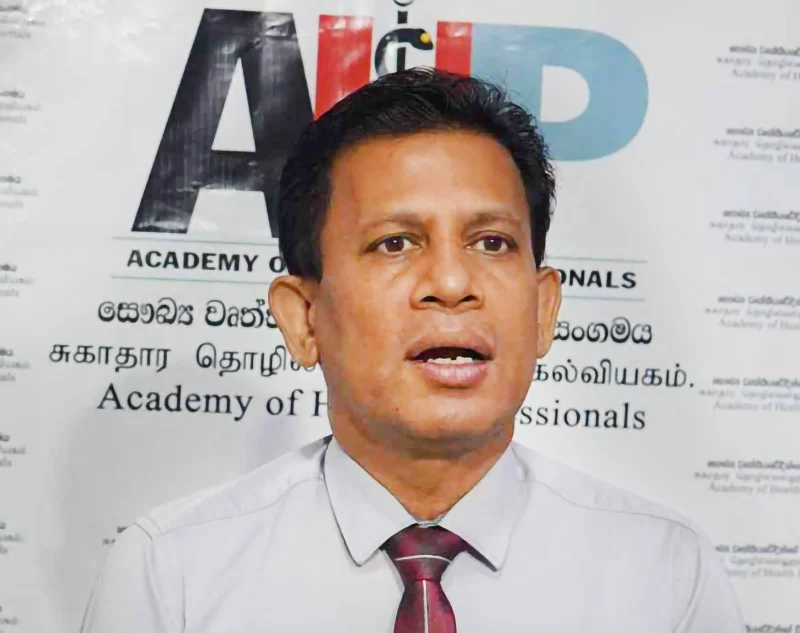
President, Academy of Health Professionals, Ravi Kumudesh, yesterday (22), alleged that the National Medicines Regulatory Authority’s (NMRA) decision to suspend several batches of Ondansetron Injection USP 8 mg/4 mL (Batch Nos: OD24021E, OD25009E, OD25024E, OD25023E), following suspicions of patient complications, and a few reported deaths, seemed to be a bid to cover-up the latest public health sector crisis.
Kumudesh said so responding to The Island queries.
Kumudesh pointed out that the Chief Executive Officer of the NMRA, and other responsible officials of the Ministry of Health, were on record as having said that the alleged bacterial contamination in the medicine in question was based on laboratory test results generated at the Microbiology Laboratory of the National Hospital, Kandy.
He, however, emphasised that the Kandy facility lacked legally mandated facilities, validated systems, or regulatory accreditation required to conduct pharmaceutical sterility testing in accordance with internationally accepted regulatory standards.
“The Academy of Health Professionals is aware that the Microbiology Laboratory of the National Hospital, Kandy, does not possess the required facilities,” Kumudesh said, urging the government to come clean in this matter.
Kumudesh said the regulatory action taken by the political authority was aimed at deceiving the public, and theAcademy of Health Professionals had raised the issues with Health Minister Dr. Nalinda Jayatissa, Health Secretary Dr. Anil Jasinghe, NMRA head Dr. Ananda Wijewickrama and Director General Health Services (DGHS) Dr. Asela Gunawardena.
Kumudesh pointed out that the Kandy facility was meant to meet requirements within the Kandy National Hospital and not a world standard testing lab. Kumedesh sought an explanation as to how the suspended Ondansetron Injection had been administered on 13 December to a person warded at the hospital where NMRA head is based, a day after the NMRA decided to suspend it.
Public health sector trade union activist Kumudesh said that the Health Ministry couldn’t turn a blind eye to the disclosure that post-mortem reports of two persons, who allegedly died after being given the same medicine by the National Institute of Infectious Diseases, did not identify the medicine as the cause of death. According to him, the National Institute of Infectious Diseases administered the same medicine to patients, on multiple occasions, in the wake of the controversy.
Kumudesh said that it would be the responsibility of the government to ensure a comprehensive technical, legal, and administrative investigation into, what he called, Ondansetron affair. Having lambasted all previous governments of waste, corruption and irregularities, at the expense of the hapless public, the NPP couldn’t, under any circumstances, side-step the issue. “In the interest of transparency, regulatory credibility, and the protection of public health, this should be properly investigated,” Kumudesh said.
The crux of the matter was that the very basis of NMRA’s suspension of Ondansetron batches seemed to be irregular and questionable, Kumudesh said.
The Academy of Health Professionals, in its letter to Dr. Jayatissa, sought the Health Ministry’s response to the following questions: 1. Who requested the Microbiology Laboratory of the National Hospital, Kandy, to conduct sterility testing on this medicinal product?
2. Under what legal provisions was such a request made, and on what basis was the laboratory authorised to accept and perform such testing?
3. Who conducted the test, and who issued the report? Did those individuals possess the requisite professional qualifications, regulatory authorisation, and legal mandate to do so?
4. Did the laboratory possess the required infrastructure, validated testing systems, quality assurance mechanisms, and specialised training necessary to perform pharmaceutical sterility testing in compliance with regulatory standards?
5. If patient complications were attributed to microbial contamination, were all related materials—including syringes, IV lines, infusion fluids, and other associated devices—systematically tested? If not, on what scientific basis was it concluded that the contamination originated exclusively from the medicine?
6. Given that the NMRA is legally empowered to suspend a medicine as a precautionary measure, even without laboratory confirmation, when serious safety concerns arise, what was the justification for relying on an irregular and non-regulatory laboratory test instead?
Kumudesh stressed that Ondansetron, and nine other injectable medicines that had been suspended, were all ordered by the State Pharmaceutical Corporation (SPC) from an Indian manufacturer, Maan Pharmaceuticals.
By Shamindra Ferdinando
News
Dr. Jayatissa visits India amidst Ondansetron controversy
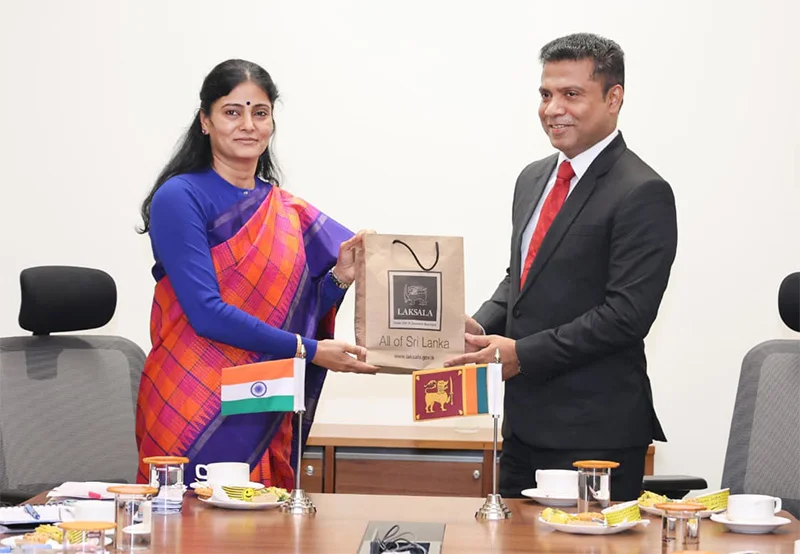
Amidst the ongoing controversy over the suspension of several batches of Indian manufactured Ondansetron Injection USP 8 mg/4 mL (Batch Nos: OD24021E, OD25009E, OD25024E, OD25023E) over safety fears, Health Minister Dr. Nalinda Jayatissa undertook a visit to New Delhi.
The Indian HC in Colombo said: ‘Dr. Jayatissa, the Minister of Health and Mass Media of the Government of Sri Lanka led a delegation to India from 17–19 December 2025 to participate in the 2nd WHO Traditional Medicine Global Summit held at Bharat Mandapam, New Delhi. The Summit was jointly organized by the World Health Organization and the Ministry of Ayush, Government of India.
The Summit was held under the theme “Restoring Balance: The Science and Practice of Health and Well-Being” and aimed to advance a global movement focused on restoring balance for individuals and the planet through the scientific understanding and practice of traditional medicine.
During the Summit, the Minister participated in the Ministerial Roundtable and delivered his remarks, highlighting Sri Lanka’s perspectives and rich traditions in Ayurveda and traditional healing.
During the visit, the Minister held bilateral meetings with Anupriya Patel, Minister of State for Health & Family Welfare, Government of India, and Prataprao Ganpatrao Jadhav, Minister of State (Independent Charge), Ministry of Ayush, Government of India. Discussions focused on strengthening cooperation in healthcare and traditional medicine, including regulatory collaboration, research linkages, and capacity-building initiatives.
On the sidelines of the programme, Minister Jayatissa also visited Apollo Hospitals to gain insights into the implementation of Public-Private Partnership (PPP) models and to explore best practices.
The visit reaffirmed the shared commitment of India and Sri Lanka to deepen collaboration in the fields of health and traditional medicine and to explore new avenues of partnership for the benefit of the people of both countries.’
-

 Midweek Review6 days ago
Midweek Review6 days agoHow massive Akuregoda defence complex was built with proceeds from sale of Galle Face land to Shangri-La
-

 News5 days ago
News5 days agoPope fires broadside: ‘The Holy See won’t be a silent bystander to the grave disparities, injustices, and fundamental human rights violations’
-

 News5 days ago
News5 days agoPakistan hands over 200 tonnes of humanitarian aid to Lanka
-

 Business4 days ago
Business4 days agoUnlocking Sri Lanka’s hidden wealth: A $2 billion mineral opportunity awaits
-

 News6 days ago
News6 days agoBurnt elephant dies after delayed rescue; activists demand arrests
-

 Editorial6 days ago
Editorial6 days agoColombo Port facing strategic neglect
-

 News8 hours ago
News8 hours agoMembers of Lankan Community in Washington D.C. donates to ‘Rebuilding Sri Lanka’ Flood Relief Fund
-

 News4 days ago
News4 days agoArmy engineers set up new Nayaru emergency bridge






